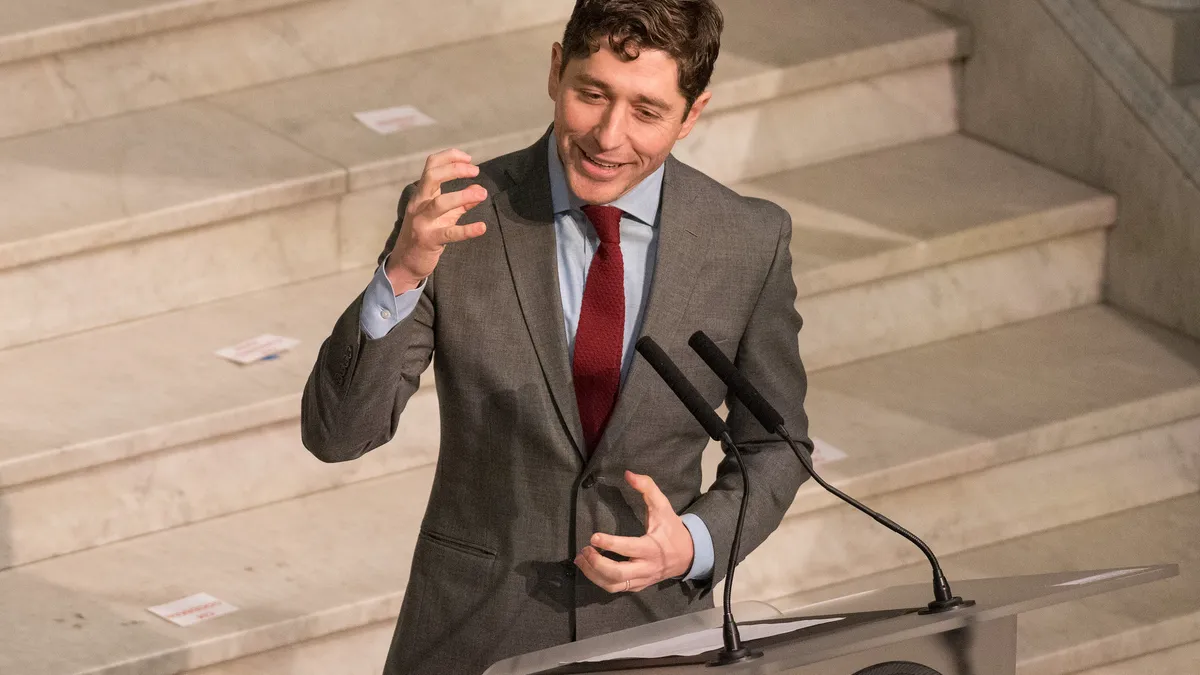Not every mayor is the subject of a tweetstorm from President Donald Trump, but that was the reality for Minneapolis Mayor Jacob Frey in early October.
Radical Left Dem Mayor of Minneapolis, Jacob Frey, is doing everything possible to stifle Free Speech despite a record sell-out crowd at the Target Center. Presidents Clinton and Obama paid almost nothing! The Minneapolis Police have been incredible....
— Donald J. Trump (@realDonaldTrump) October 8, 2019
The tweet made Frey a national storyline, but he found himself bemused by the attention.
"I work my tail off every day filling potholes and trying to tackle an affordable housing crisis and addressing climate change," Frey told Smart Cities Dive. "With a city of 430,000 [people], I don't have the time to be tweeting out garbage."
Frey and Minneapolis have been busy making headlines in other ways, such as through the final approval of a first-in-the-nation elimination of exclusive zoning for single-family homes. It is a forward-looking approach that has marked Frey and his staff in the city out as pioneers in their use of land-use planning.
The plan, part of its Minneapolis 2040 blueprint that lays out a long-term vision for the city, comes with most of the area zoned only for single-family homes. It is part of an effort to encourage more affordable housing options in a city that, like many others, is struggling to diversify its housing options.
"You could still put up a single-family home, you could still put up a mansion, all we're saying is in addition to being able to put up the mansion, you can also put up something more affordable in the form of a duplex or a triplex and build a greater density along commercial corridors," Frey said.
The zoning change is a result of the city’s discriminatory past, where neighborhoods were subject to the system known as redlining, a systematic denial of services to residents deemed to live in certain areas based on race, as well as other segregation-inducing housing policies.
"We wanted to make sure the precision of our solutions matched the precision of the harm that was initially inflicted, and that harm was precise," Frey said.
That commitment to equity has extended to a partnership between the city, Minneapolis Public Schools (MPS), the city's public housing authority, Hennepin County and nonprofits, called Stable Homes Stable Schools. Frey said around 7% of the city's school-age population experience homelessness and even more experience severe housing instability — and of those, 75% are African American.
As part of the program, the city provides long-term rental assistance for families experiencing homelessness and has an emergency rental assistance fund for those that run into temporary hardship, like losing a job. Frey said after helping people out for a few months, most individuals are still in stable housing a year later. He said it represents a long-term investment in people's quality of life, and is the kind of forward-thinking approach needed in more cities to tackle these issues.
"This is the right thing to do, it's — I believe — a moral imperative to provide housing for people who need it, especially young children, but it's also financially smart," Frey said. "If we can prevent homelessness to begin with, it's far cheaper than having someone cycle through shelters and hospital stays and sometimes jail."
The city is also battling the effects of climate change, which has meant harsher winters and hotter summers. Frey and his colleagues have looked to dramatically cut emissions in the transportation sector. Some of those efforts have included adding bus-only lanes, helping the mobility option run more smoothly than single-occupancy vehicles. The city is also piloting mobility hubs as a one-stop shop for transportation options by light rail stations.
The efforts together form a long-term vision that Frey and members of the Minneapolis City Council hope will help make the lives of all residents better. "The way we’re viewing it, we’re leveling the playing field," Paul Mogush, manager of long-term planning at the City of Minneapolis, said during a panel discussion at the CityLab conference in October.
"We're just planning for the future, and that's something every forward-looking city should be doing," Frey said.












